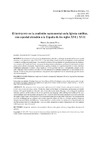Please use this identifier to cite or link to this item:
https://accedacris.ulpgc.es/jspui/handle/10553/41992
| Title: | El intérprete en la confesión sacramental en la Iglesia católica, con especial atención a la España de los siglos XVI y XVII | Other Titles: | The interpreter in the sacramental confession in the Catholic Church, with special attention to sixteenth- and seventeenth-century Spain | Authors: | Sarmiento Pérez, Marcos Antonio | UNESCO Clasification: | 57 Lingüística | Keywords: | Mediación lingüística Confesión sacramental Intérprete Moriscos Inquisición, et al |
Issue Date: | 2018 | Publisher: | 2253-797X | Journal: | Culture & History Digital Journal | Abstract: | En el marco de la historia de la interpretación y enfocado a la Europa occidental católica, con especial atención a la España de los siglos XVI y XVII, el presente trabajo aborda la mediación lingü.stica cuando penitente y confesor no hablan la misma lengua. Tras esbozar la evolución del sacramento de la penitencia hasta las regulaciones emanadas del Concilio de Trento, se exponen las disposiciones eclesiásticas que fijaron la intervención de intérpretes en la confesión sacramental. Seguidamente se aportan evidencias de su puesta en práctica en varios colectivos multilingües (peregrinos y cruzados, tropas españolas y de la Liga Santa, moriscos, vascoparlantes, europeos en España e indígenas en las Canarias), así como en la concurrencia de la confesión sacramental y el otorgamiento de testamento. Se trata de una primera aproximación a una parcela aún inexplorada desde la traductología, que abre nuevas vías de investigación. The interpreter in the sacramental confession in the Catholic Church, with special attention to sixteenth- and seventeenth-century Spain.- Within the context of the history of interpreting and focusing on Catholic Europe, with special attention to sixteenth- and seventeenth-century Spain, this paper looks at linguistic mediation between a penitent and his confessor who do not speak the same language. After outlining the evolution of the sacrament of penance up to the regulations arising from the Council of Trent, the ecclesiastical provisions that established the degree of intervention of interpreters in the sacramental confession are presented. Evidence of its implementation in several multilingual groups (pilgrims and crusaders, Spanish soldiers, the Moriscos, Euskcra speakers, Europeans living in Spanish territory, and indigenous Canary islanders), as well as in the concurrence of sacramental confession and the making of the will is then provided. This is an initial approach to an area of traductology still to be explored, which opens new lines of research. |
URI: | https://accedacris.ulpgc.es/handle/10553/41992 | ISSN: | 2253-797X | DOI: | 10.3989/chdj.2018.012 |
| Appears in Collections: | Artículos |
SCOPUSTM
Citations
4
checked on Jun 8, 2025
Page view(s)
293
checked on Jan 16, 2026
Download(s)
258
checked on Jan 16, 2026
Google ScholarTM
Check
Altmetric
Share
Export metadata
Items in accedaCRIS are protected by copyright, with all rights reserved, unless otherwise indicated.
